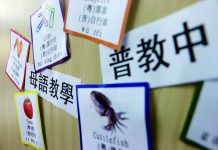Susanne Choi yuk-ping, a sociology professor at the Chinese University of Hong Kong, says it was easy for the government and media to feed people’s fears over the abode saga because there was an underlying sense of insecurity and identity crisis in Hong Kong at the time of the handover.
Choi says that over time, as China’s economic and geopolitical clout increased, Hong Kong appears to have become less important to the Mainland, while Beijing’s interference in local affairs has increased. People feel they are losing control over their own future. She says mainstream Hong Kong society projects its fear and feelings of disgust with the Chinese government, as well as its discrimination against the disadvantaged classes, onto new immigrants from the Mainland. “Mainland immigrants are the scapegoats of China’s politics,” she says.
On the other hand, Choi says the SAR government expects to get a share in the fruits of China’s growing economy, in schemes such as the Individual Visit Scheme (IVS) that was introduced in July 2003. “It is a commercial and economic policy, which has a total disregard for livelihood issues,” says Choi.
The scheme puts pressure on Hong Kong’s transportation and public spaces, but people often do not distinguish between immigrants and visitors and stigmatise them as one group of Mainlanders, adds Choi.
According to the Security Bureau, there have been around 212.6 million visits under the individual visit scheme since it started in 2003, with an average of more than 27 million visits each year in the past four years. Around 879,000 people from the Mainland came to join their families between 1997 and 2015. Meanwhile, more than 202,000 children who were born in Hong Kong to non-Hong Kong parents between 2001 and 2012, automatically got residency rights.
While some Hong Kong people may dislike new immigrants because they think they drain public resources, others see them as an impediment to Hong Kong’s democratic development because they are more likely to support pro-Beijing political parties.
Ma Ngok, a professor from the Department of Government and Public Administration at CUHK, co-authored a study on mainland migrants and democratisation in 2016. It found mainland migrants are more likely to vote for pro-establishment candidates and support conservative governance. Ma explains that most mainland migrants come to Hong Kong for economic reasons rather than to pursue freedom and democracy. He says they do not identify with democracy, and pro-establishment parties have more resources and money to win their support. Ma adds this is likely to change if they are gradually socialised by Hong Kong but the pace of socialisation is slow.
But CUHK sociologist Susanne Choi disagrees. “Most migrants are not supporters of pro-establishment camps. They don’t know their political stances. They know nothing about Hong Kong’s political environment,” Choi says.
She says her research shows that 13 per cent of immigrants are pro-establishment, 18 per cent of them are pro-democracy and more than 50 per cent are politically neutral. She says it is for the pro-democracy parties to try to win their support.
Former abode seeker Yu Xiaoqing says new immigrants can also support democracy, but “the real democracy is not only about voting, but also about whether we know how to include all people in the agenda of democracy”.
Edited by Lynette Zhang









































